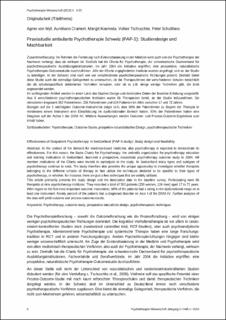Please use this identifier to cite or link to this item:
https://doi.org/10.21256/zhaw-1965Full metadata record
| DC Field | Value | Language |
|---|---|---|
| dc.contributor.author | von Wyl, Agnes | - |
| dc.contributor.author | Crameri, Aureliano | - |
| dc.contributor.author | Koemeda, Margit | - |
| dc.contributor.author | Tschuschke, Volker | - |
| dc.contributor.author | Schulthess, Peter | - |
| dc.date.accessioned | 2018-04-25T14:12:58Z | - |
| dc.date.available | 2018-04-25T14:12:58Z | - |
| dc.date.issued | 2013 | - |
| dc.identifier.issn | 0943-1950 | de_CH |
| dc.identifier.issn | 1613-7604 | de_CH |
| dc.identifier.uri | https://digitalcollection.zhaw.ch/handle/11475/5579 | - |
| dc.description.abstract | Im Rahmen der Forderung nach Evidenzbasierung in der Medizin wird auch von der Psychotherapie der Nachweis verlangt, dass sie wirksam ist. Deshalb hat die Charta für Psychotherapie, der schweizerische Dachverband für psychotherapeutische Ausbildungsinstitutionen, im Jahr 2004 die Initiative ergriffen, eine prospektive, naturalistische Psychotherapie-Outcomestudie durchzuführen. Alle der Charta angegliederten Institute wurden angefragt, sich an der Studie zu beteiligen. In der Schweiz sind nach wie vor verschiedenste psychotherapeutische Richtungen präsent. Deshalb bietet diese Studie auch die einmalige Gelegenheit zu untersuchen, ob die TherapeutInnen der verschiedenen Schulen tatsächlich die als schulenspezifisch deklarierten Techniken benutzen, oder ob es z.B. einige wenige Techniken gibt, die breit angewendet werden. Im vorliegenden Artikel werden in erster Linie das Studien-Design und deskriptive Daten der Baseline-Erhebung vorgestellt. Aus 9 verschiedenen psychotherapeutischen Instituten waren 86 Therapeuten bereit, an der Studie teilzunehmen. Sie rekrutierten insgesamt 362 PatientInnen, 238 Patientinnen und 124 Patienten im Alter zwischen 17 und 72 Jahren. Bezogen auf die 5 wichtigsten Outcome-Instrumente zeigte sich, dass 80% der PatientInnen zu Beginn der Therapie in mindestens einem Instrument eine Einschätzung im dysfunktionalen Bereich hatten. 90% der PatientInnen hatten eine Diagnose auf der Achse I des DSM IV. Weitere Auswertungen werden Outcome- und Prozess-Outcome-Ergebnisse zum Inhalt haben. In the context of the demand for evidence-based medicine, also psychotherapy is expected to demonstrate its effectiveness. For this reason, the Swiss Charta for Psychotherapy, the umbrella organization for psychotherapy education and training institutions in Switzerland, launched a prospective, naturalistic psychotherapy outcome study in 2004. All member institutions of the Charta were invited to participate in the study. In Switzerland many types and subtypes of psychotherapy continue to exist. The study therefore also provides the unique opportunity to investigate whether therapists belonging to the different schools of therapy in fact utilize the techniques declared to be specific to their types of psychotherapy, or whether, for instance, there are just a few techniques that are widely utilized. This article primarily presents the study design and the descriptive data in the baseline survey. Participating were 86 therapists at nine psychotherapy institutes. They recruited a total of 362 patients (238 women, 124 men) aged 17 to 72 years. With regard to the five most important outcome instruments, 80% of the patients had a rating in the dysfunctional range on at least one instrument. Ninety percent of the patients had a diagnosed disorder on Axis I of the DSM-IV. Further analyses of the data will yield outcome and process-outcome results. | de_CH |
| dc.language.iso | de | de_CH |
| dc.publisher | Springer | de_CH |
| dc.relation.ispartof | Psychotherapie Forum | de_CH |
| dc.rights | http://creativecommons.org/licenses/by-nc-nd/4.0/ | de_CH |
| dc.subject.ddc | 616.89: Psychische Störungen, klinische Psychologie und Psychiatrie | de_CH |
| dc.title | Praxisstudie ambulante Psychotherapie Schweiz (PAP-S) : Studiendesign und Machbarkeit | de_CH |
| dc.type | Beitrag in wissenschaftlicher Zeitschrift | de_CH |
| dcterms.type | Text | de_CH |
| zhaw.departement | Angewandte Psychologie | de_CH |
| zhaw.organisationalunit | Psychologisches Institut (PI) | de_CH |
| dc.identifier.doi | 10.21256/zhaw-1965 | - |
| zhaw.funding.eu | No | de_CH |
| zhaw.issue | 1 | de_CH |
| zhaw.originated.zhaw | Yes | de_CH |
| zhaw.pages.end | 22 | de_CH |
| zhaw.pages.start | 6 | de_CH |
| zhaw.publication.status | publishedVersion | de_CH |
| zhaw.volume | 3 | de_CH |
| zhaw.publication.review | Peer review (Publikation) | de_CH |
| zhaw.webfeed | Klinische Psychologie | de_CH |
| zhaw.funding.zhaw | Praxisstudie ambulante Psychotherapie (PAP-S) | de_CH |
| Appears in collections: | Publikationen Angewandte Psychologie | |
Files in This Item:
| File | Description | Size | Format | |
|---|---|---|---|---|
| 2013_von Wyl_Praxisstudie ambulante Psychotherapie Schweiz (PAP-S).pdf | 259.28 kB | Adobe PDF |  View/Open |
Show simple item record
von Wyl, A., Crameri, A., Koemeda, M., Tschuschke, V., & Schulthess, P. (2013). Praxisstudie ambulante Psychotherapie Schweiz (PAP-S) : Studiendesign und Machbarkeit. Psychotherapie Forum, 3(1), 6–22. https://doi.org/10.21256/zhaw-1965
von Wyl, A. et al. (2013) ‘Praxisstudie ambulante Psychotherapie Schweiz (PAP-S) : Studiendesign und Machbarkeit’, Psychotherapie Forum, 3(1), pp. 6–22. Available at: https://doi.org/10.21256/zhaw-1965.
A. von Wyl, A. Crameri, M. Koemeda, V. Tschuschke, and P. Schulthess, “Praxisstudie ambulante Psychotherapie Schweiz (PAP-S) : Studiendesign und Machbarkeit,” Psychotherapie Forum, vol. 3, no. 1, pp. 6–22, 2013, doi: 10.21256/zhaw-1965.
VON WYL, Agnes, Aureliano CRAMERI, Margit KOEMEDA, Volker TSCHUSCHKE und Peter SCHULTHESS, 2013. Praxisstudie ambulante Psychotherapie Schweiz (PAP-S) : Studiendesign und Machbarkeit. Psychotherapie Forum. 2013. Bd. 3, Nr. 1, S. 6–22. DOI 10.21256/zhaw-1965
von Wyl, Agnes, Aureliano Crameri, Margit Koemeda, Volker Tschuschke, and Peter Schulthess. 2013. “Praxisstudie ambulante Psychotherapie Schweiz (PAP-S) : Studiendesign und Machbarkeit.” Psychotherapie Forum 3 (1): 6–22. https://doi.org/10.21256/zhaw-1965.
von Wyl, Agnes, et al. “Praxisstudie ambulante Psychotherapie Schweiz (PAP-S) : Studiendesign und Machbarkeit.” Psychotherapie Forum, vol. 3, no. 1, 2013, pp. 6–22, https://doi.org/10.21256/zhaw-1965.
Items in DSpace are protected by copyright, with all rights reserved, unless otherwise indicated.